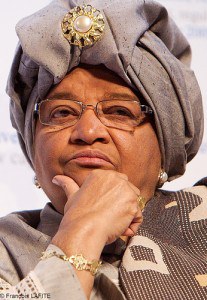Liberian President's Victory Is Marred by Low Turnout and Violence

Ellen Johnson-Sirleaf won by a landslide, according to early results. But will she be able to unite a badly divided nation?
It looks like Liberia’s President Ellen Johnson-Sirleaf won a second term in a run-off election this week, but only time will tell if the divisions that became apparent during the election will continue to haunt the country.
On Friday early results show Sirleaf won 90.8 percent of the votes returned, a landslide victory against her opponent, Congress for Democratic Change (CDC) leader and opposition candidate Winston Tubman. On October 11 Sirleaf won nearly 44 percent of the first round vote and Tubman took around 33 percent, but Sirleaf didn’t pass the 50 percent threshold needed for outright victory—leading to a run-off election this past Tuesday. Tubman had said he would only participate in a second round vote if it were delayed by two to four weeks and if counting procedures were amended.
On Monday violent clashes erupted between Liberian police and protestors from the CDC, leaving at least two dead, according to the UN. Tubman, Liberia’s former justice minister, claimed that eight people died and that he and his running mate, soccer superstar George Weah, were targeted for assassination.
Photos seen around the world showed at least one dead body and many wounded, images reminiscent of those seen during Liberia's 14-year civil war. Protestors fled into CDC headquarters as tear gas and bullets were fired on the building and tanks surrounded the compound.
The protests started after Tubman announced the party would boycott the run-off election, claiming voter fraud and ballot box stuffing in the first round of elections.
Speaking to reporters Thursday at Monrovia's Foreign Ministry, Sirleaf said that if she wanted to steal the election, she would have won outright in the first round instead of having to go to a run-off. “
It's so common for somebody to call fraud when you don't win,” she said.
Victoria Nuland, a spokesperson for the U.S. State Department, said the United States was “deeply disappointed” by the decision of the CDC to boycott the run-off election. “The CDC’s charge that the first-round election was fraudulent is unsubstantiated,” said Nuland. “As evidenced by international and domestic observers, Liberia’s October 11 first-round presidential and legislative elections were fair, free and transparent.”
The U.S. State Department, the African Union, and the United Nations have criticized Tubman's decision to boycott the vote. The Carter Center, the United Nations, and the Economic Community of West African States said the election was mostly fair.
On Tuesday Sirleaf said in a press release that she expresses “deep sorrow and regret over the violence which resulted in the death, Monday, at CDC headquarters.” She said an investigation is currently being conducted, promising that perpetrators will be brought to justice.
Election observers say the streets and polling stations were quiet on Tuesday as voters stayed away either out of fear of renewed violence or apathy after Tubman pulled out of the race. Turnout in Tuesday's poll was 37.4 percent, a dismally low number compared to the 71 percent who voted in the first round a month ago.
The question now is whether low voter turnout will undermine Sirleaf’s presidency.
The election last month was the first democratically run elections in Liberia since the end of the civil war. The UN peacekeeping mission in Liberia ran the election in 2005 that ushered in Sirleaf’s first term as president. Tuesday’s election was supposed to show the world how far Liberia had come since the war ended in 2003 and that it was ready for foreign investment in such natural resources as iron ore and oil. Instead it proved how deep the divisions in the country remain.
Tubman told Reuters that he would not accept the result and may seek to have it annulled.
Nat Bayjay, a Liberian journalist from Frontpage Africa, believes Sirleaf's second term will be extremely difficult following “one of the worst elections in the history of the country.” Bayjay, who is currently visiting the United States said, “This is haunting her. Sirleaf will have a serious challenge and a divided nation. She has a serious reconciliatory issue at hand.”
On Thursday at Monrovia's Foreign Ministry, the president emphasized that she is not worried that her mandate has been weakened by the lack of voters.
“The numbers themselves will give us a mandate,” Sirleaf said. “And I think what we do to bring the Liberian people together will strengthen that mandate.”
More articles by Category: International, Politics
More articles by Tag: Africa, Women's leadership



























